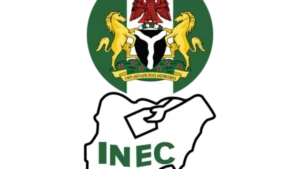Rejoinder to ADC’s Statement on INEC Voter Registration Figures In Osun.
> “The surge we are witnessing in voter registration is not a glitch or manipulation; it is democracy coming alive. Nigerians are more politically conscious today than at any other time in our history, and it should be celebrated, not doubted. INEC has shown transparency by publishing its data for all to see, and those who question the figures are free to verify them. Instead of sowing suspicion, political parties should return to the grassroots and mobilize their members. The people are ready for 2027, and the numbers simply prove it.”
— Princess G. Fraser, MFR
The attention of the Independent National Electoral Commission (INEC) has been drawn to a statement credited to Mallam Bolaji Abdullahi, National Publicity Secretary of the African Democratic Congress (ADC), raising doubts about the first set of data released on the ongoing Continuous Voter Registration (CVR) exercise. While we respect the right of all political stakeholders to interrogate the process, it is important that such interventions are grounded in fact and not couched in conspiracy theories or partisan anxiety.

INEC’s decision to publish the data was borne out of a commitment to transparency. By releasing figures weekly, Nigerians are allowed to scrutinize, verify, and challenge where necessary. This openness is the hallmark of a credible electoral body.
The Osun State Numbers: A Contextual Perspective
ADC’s spokesman finds it “statistically implausible” that Osun State recorded 393,269 pre-registrations in one week, compared to 275,815 new registrations over four years (2019–2023). But this conclusion ignores several important dynamics:

1. A New Political Awakening: Nigeria is experiencing unprecedented political consciousness. The surge in youth participation during the 2023 general elections has ignited a civic reawakening. Citizens who were previously indifferent now see registration as an investment in their future.
2. Regional Mobilization: President Bola Ahmed Tinubu, a son of the Southwest with deep roots in Osun State, has galvanized political interest in the region. As political scientists often note, “representation inspires participation.” What is unfolding in Osun is not fraud — it is the energy of a people mobilizing for their own.

3. Governors’ Role in Sensitization: INEC does not operate in a vacuum. Each state government has a responsibility to encourage civic participation. Where governors and grassroots leaders succeed in mobilizing, the figures will naturally rise. To use Abraham Lincoln’s words: “Elections belong to the people. It is their decision.” In Osun, the people are clearly making theirs.
Comparative Lessons from Other Democracies
Nigeria is not the first country to witness a sudden spike in voter registration:

- In Kenya (2017), following aggressive civic education campaigns, registration surged by over 36% in less than two months, particularly among the youth.
- In India, the world’s largest democracy, certain states have recorded voter enrollment spikes of 40% within weeks of targeted mobilization campaigns.
- In the United States (2008), with Barack Obama’s historic candidacy, some states saw unprecedented voter registration drives, breaking decades-long trends.
These examples show that political enthusiasm and social context drive voter registration numbers. Nigeria’s surge should therefore be seen not as an anomaly but as a positive indicator of democratic consolidation.
Opposition Politics or Fear of Irrelevance?
It is curious that the ADC, which has minimal presence in Osun State, is the loudest voice questioning the surge in voter enthusiasm there. Osun is currently governed by the PDP, not the APC. If indeed thousands are rushing to register, it could just as well benefit the ruling party in the state. Why then should the ADC — which ranks below APGA and the Labour Party in terms of registered members — be the one to cry foul?
History teaches us that new political parties take decades to achieve broad national relevance:
- The Labour Party in the UK was founded in 1900 but did not form a government until 1924, 24 years later.
- The Democratic Alliance in South Africa remained in opposition for decades before becoming a significant challenger to the ANC.
- Even in the U.S., Abraham Lincoln’s Republican Party — founded in 1854 — struggled before its first presidential breakthrough in 1860.

The truth is, ADC is still a fringe party in Nigeria, and no amount of casting aspersions on INEC will change its standing. Instead of lamenting about figures, the ADC should be in the field mobilizing its members. As John F. Kennedy once said: “Effort and courage are not enough without purpose and direction.”
INEC’s Responsibility and Credibility
INEC operates within the powers granted by the Constitution of the Federal Republic of Nigeria to organize elections, maintain the voter register, and ensure free, fair, and credible polls. Releasing registration data — with breakdowns by state and geopolitical zones — is part of our transparency commitment.
It is misleading to equate rising figures with manipulation. Every registration is traceable to biometric data and server logs. Indeed, INEC welcomes scrutiny. Those who doubt the authenticity of the figures should conduct independent verification instead of whipping up unnecessary fears.

The Road to 2027
The surge in voter registration is a positive sign for Nigerian democracy. It means that citizens are preparing for high voter turnout in 2027, potentially an increase of up to 80% in Southwest Nigeria alone. This is democracy at work: people taking ownership of their civic duty.
Political parties must therefore rise to the occasion. Rather than crying foul, the ADC should channel its energy into grassroots mobilization, perception management, and building internal capacity. To do otherwise is to signal defeat even before the race has begun.
Conclusion
The voter register is the bedrock of elections, and INEC is determined to keep it credible and transparent. But credibility is not achieved by suppressing figures that appear “too high” for partisan comfort. It is achieved by documenting, verifying, and publishing openly — which is exactly what INEC has done.
The surge in Osun and across the Southwest is a reflection of political consciousness, regional mobilization, and civic awakening — not evidence of foul play. The ADC’s attempt to sow doubt is less about electoral integrity and more about political insecurity.
As Franklin D. Roosevelt once said: “The only thing we have to fear is fear itself.” Nigerian democracy is growing stronger, and INEC will not be deterred by unfounded suspicions.
The time has come for all stakeholders — ruling and opposition alike — to embrace this new era of participation. Nigerians are ready. The numbers are proof. We commend the effort of the Governors and Democratic institutions to mobilize the grassroots to register to vote.
Osun State has done well.
What INEC needs to do now, is to ensure voters who wish to perform their civic duties, register in their indigenous states for peace during elections in their states of residence as is done in the USA. Nigerian democratic set up was modeled after the American template, so this must be amended as there are multiple reasons why voters must vote from their states of origin. I will address this in a separate article.
Princess G. Adebajo-Fraser MFR.
Founder, The National Patriots.
International Consultants, Perception Management Expert.
The African Democratic Congress (ADC) has viewed the first set of data released by the Independent National Electoral Commission (INEC) on new Continuous Voter registrations with great concern.
According to INEC’s figures, Osun State alone recorded 393,269 pre-registrations in just one week. To put this in context, Osun added only 275,815 new voters between 2019 and 2023, a period of four years. In other words, Osun has now supposedly registered more people in seven days than it managed to do in an entire electoral cycle of four years.
Even at its highest point of political mobilisation in 2022, Osun has never produced more than 823,124 votes cast in the Governorship Election. Now, by some miracle, nearly 20 percent of all eligible adults in the state have rushed to register. This is not just unusual, it is statistically implausible.
The anomalies become even more glaring when viewed in the context of the overall registration report. Across the six geopolitical zones, the South West alone accounts for 848,359 pre-registrations, an astonishing 67 percent of the national total. By contrast, the entire South East recorded just 1,998 pre-registrations. To further illustrate, three states—Osun, Lagos, and Ogun—make up 54.2 percent of all pre-registrations in Nigeria, while five states combined—Ebonyi, Imo, Enugu, Abia, and Adamawa—barely recorded 4,153, or 0.2 percent, while the entire North East recorded just 6.1 percent.
These fantastic figures suggest either another technical “glitch” in INEC’s digital registration system, or a more troubling possibility of deliberate manipulation of data to lay the ground for a more sinister agenda in the coming elections. In either case, INEC has some explanations to give.

We must be clear: the voter register is the foundation upon which the entire electoral process rests. If the foundation is compromised, it brings the integrity of the elections into question. Nigerians still remember the bitter consequences of flawed voter rolls and “technical glitches” in past elections. Our democracy cannot withstand another one.
The ADC therefore calls on INEC to urgently conduct and publish a full forensic audit of the first-week pre-registration data, with a state-by-state breakdown of both physical and online registrations. INEC should also disclose the server logs, bandwidth distribution, and regional access reports for the registration portal during this period.
We call on all opposition political parties to set aside rivalry and jointly demand clarity from INEC on these glaring anomalies. We urge election monitoring groups, fact-checking organisations, and legal advocacy bodies to independently interrogate these numbers and press for accountability.

We also invite our partners in the international community—the United Nations, the African Union, ECOWAS, and Nigeria’s democratic allies—to take an early interest in these developments, as the credibility of the 2027 elections begins with the integrity of this voter register.
The credibility of our democracy cannot be left to chance. Silence in the face of these anomalies would amount to complicity. The ADC believes Nigerians deserve an explanation, and we will continue to insist that INEC provides one.
History has shown that when questions about the voter register are left unanswered, the consequences go beyond politics; they touch on national stability itself.
The time to act is now.
Mallam Bolaji Abdullahi
National Publicity Secretary
African Democratic Congress (ADC).





